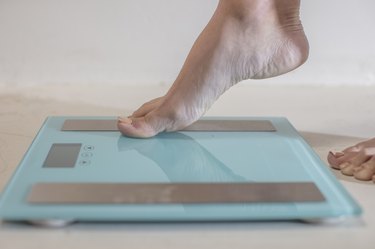
If you have ovarian cysts, finding a weight-loss plan that works can require focus and patience. Frustrated? The hormonal changes that come with polycystic ovary syndrome (PCOS), in particular, can make weight loss a challenge. Balancing hormones, including insulin, is key.
Read more: The Complicated Ways Weight and PCOS Are Connected
Video of the Day
Video of the Day
About Ovarian Cysts
Ovarian cysts — which are often fluid-filled sacks that form inside or on the outside of your ovary — are extremely common in premenopausal people and are one symptom of PCOS, according to the Office on Women's Health, part of the U.S. Department of Health and Human Services.
These cysts vary in terms of size, severity and symptoms, per the Office of Women's Health. Accordingly, several types include:
- Endometriomas. These are caused by the lining of the uterus growing outside the uterus.
- Dermoid cysts. These come from cells present at birth but can grow large.
- Cystadenomas. These are filled with watery fluid and can sometimes grow large.
The most common types of ovarian cysts, however, are follicle cysts and corpus luteum cysts, which form either when the tiny sac inside your ovary (follicle) doesn't break open to release an egg, or when the leftover sac doesn't shrink away after release of the egg. Most of the time, notes the Office of Women's Health, these cysts do not cause symptoms and go away on their own. But when they are frequent, they can be a sign of PCOS.
Hormonal Weight Gain
PCOS is mainly a hormonal condition, which often leads to many small cysts within your ovaries, the Office of Women's Health explains. The associated hormone shifts can make it difficult to lose weight, maintain regular period cycles or become pregnant, according to the Cleveland Clinic.
Among people with PCOS, about 10 percent have diabetes and another 25 percent have pre-diabetes, meaning they have insulin resistance, says Steven Lindheim, MD, a clinical professor of obstetrics and gynecology at Wright State University in Dayton, Ohio. He explains that about half of people with PCOS have overweight and that reducing body fat can help with the effects of PCOS — including fertility challenges.
According to the Cleveland Clinic, insulin resistance is one of the root hormonal imbalances associated with PCOS. When your body becomes resistant to the hormone insulin, which helps lower your blood sugar by moving it into your cells, your pancreas pumps out more and more insulin because it keeps detecting high sugar levels in your blood.
Insulin is also a fat-storing hormone, according to the Cleveland Clinic, which means that all this extra insulin floating around signals your body to store fat, causing weight gain — particularly in the belly area.
Weight Loss and PCOS
So how do you focus on improving insulin resistance to lose weight with PCOS? According to Dr. Lindheim, the tried-and-true methods of calorie reduction and physical activity hold true for people with PCOS.
"If you can walk 30 minutes about three times a week, you'll lose roughly about one pound per week doing that," Dr. Lindheim says. "It sounds simple, but for some women that's really challenging."
He says that a straightforward formula — reducing calorie intake and increasing activity — is more important than the types of calories you're consuming when it comes to weight loss outcomes. This is bolstered by research, too. For instance, a meta-analysis of 14 studies, published in August 2016 in the Diabetes & Metabolism Journal, found that regular exercise improved insulin sensitivity significantly, and the benefit lasted for 72 hours or longer.
Having said that, there are some foods that you may want to avoid. Another meta-analysis, which reviewed 25 studies and was published in the European Journal of Obstetrics & Gynecology and Reproductive Biology in March 2020, found that lower-carbohydrate diets helped improve insulin resistance in people who had PCOS.
Effects of Weight Loss
How much weight should you aim to lose? "We often counsel women who have elevated body mass index who also have PCOS to reduce their weight by 10 percent to improve their fertility," Dr. Lindheim says, noting that PCOS can make it more difficult to get pregnant. "If you lose just 10 percent of your body weight, you will significantly improve your likelihood of conception," he says.
And there are other benefits to losing weight as well if you have this condition. An August 2016 study in the Journal of Clinical Endocrinology & Metabolism found that weight loss helped to improve mental and emotional well-being in people who had PCOS, especially when combined with oral contraceptive therapy.
- U.S. Department of Health and Human Services Office on Women's Health: "Ovarian Cysts"
- Cleveland Clinic: "Ovarian Cysts"
- Steven Lindheim, MD, clinical professor, obstetrics and gynecology, Wright State University, Dayton, Ohio
- Cleveland Clinic: "Controlling Your Blood Sugar Can Improve Your PCOS and Hormone Imbalance"
- European Journal of Obstetrics & Gynecology and Reproductive Biology: "Diets With Lower Carbohydrate Concentrations Improve Insulin Sensitivity in Women With Polycystic Ovary Syndrome: A Meta-Analysis"
- Diabetes & Metabolism Journal: "The Effect of Regular Exercise on Insulin Sensitivity in Type 2 Diabetes Mellitus: A Systematic Review and Meta-Analysis"
- U.S. Department of Health and Human Services Office on Women's Health: "Polycystic Ovary Syndrome"
- Journal of Clinical Endocrinology & Metabolism: "Weight Loss and Lowering Androgens Predict Improvements in Health-Related Quality of Life in Women With PCOS"
Is this an emergency? If you are experiencing serious medical symptoms, please see the National Library of Medicine’s list of signs you need emergency medical attention or call 911.